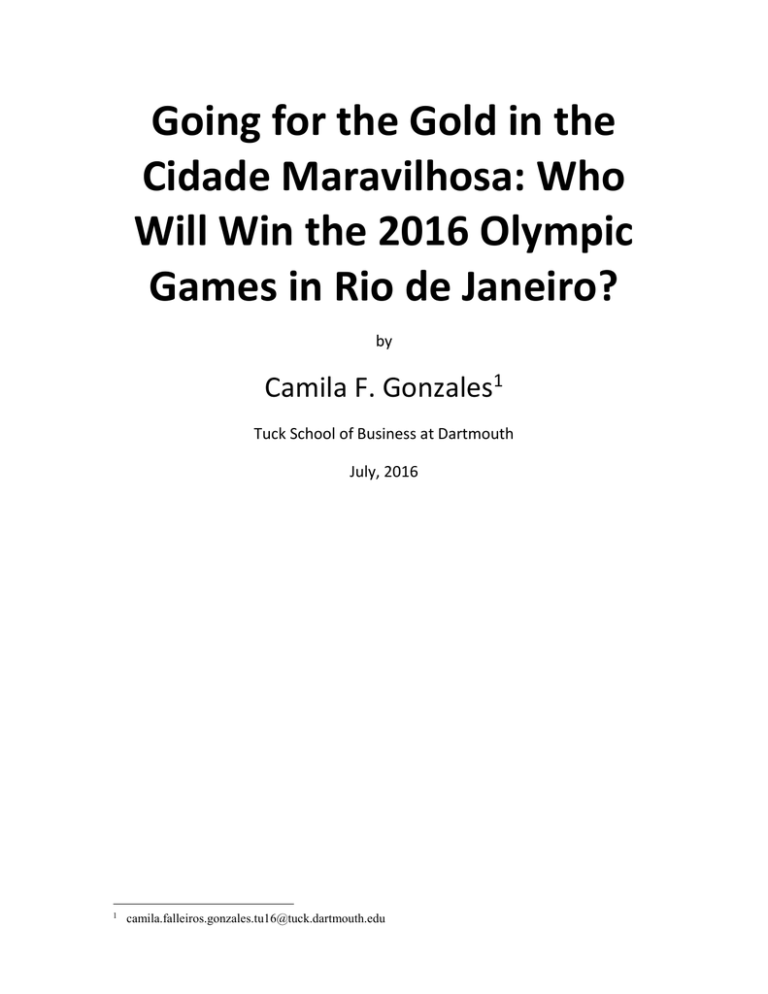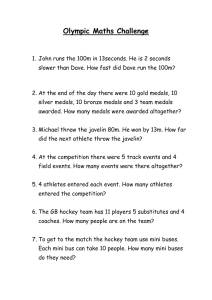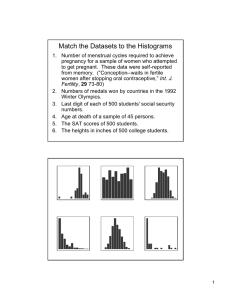Tuck School of Business 2016 Olympic Predictions
advertisement

Going for the Gold in the Cidade Maravilhosa: Who Will Win the 2016 Olympic Games in Rio de Janeiro? by Camila F. Gonzales1 Tuck School of Business at Dartmouth July, 2016 1 camila.falleiros.gonzales.tu16@tuck.dartmouth.edu The Summer Olympic Games in Rio are approaching fast and Brazil is ready to celebrate sports with the same excitement and energy it showed during the World Cup two years ago. Even though the Olympics are not centered on soccer, Brazil’s national passion, the country’s enthusiasm to receive the best athletes in the world certainly surpasses the lack of familiarity with some of the Olympic sports – who can actually name the five sports in Modern Pentathlon? However, this is not by far the most important question in the moment. When the Games are the topic on the table, people around the world are asking – who will win the Olympics? This study presents country-level predictions for total and gold medals by country for the Rio 2016 Games. The current work builds on the successful Olympic medal prediction formula developed by Professor Andrew Bernard of the Tuck School of Business at Dartmouth. This formula has been the most accurate predictor of country Olympic success since it was unveiled before the Sydney Games in 2000;2 the model predicted the 2012 London total medal count with an astounding 98% accuracy. Interestingly, knowledge about sports or athletes does not matter for the predictions, which are based only in economic variables, such as income per person, population and performance in prior Olympic Games. In previous games, there has been a strong home field advantage, with the host country winning significantly more medals – including more gold medals – in comparison to its past performances. This effect is likely to be less evident for Brazil this time, due to the country’s lack of continuous support for sports and athletes in the years leading up to “Who Won the Olympics Forecasting Competition?” NumbersGuy Blog, August 27, 2008, Wall Street Journal, wsj.com 2 the Olympics. Olympic athletes are not “built” overnight; they are a result of lifetime investments in the individuals and in infrastructure, which the country has not prioritized in the last decades. Table 1: Top 5 Medal Winning Countries Country United States China United Kingdom Russian Federation Germany Predicted Total Medals in Rio 105 89 67 62 48 Total Medals won in London 104 88 65 82 44 Table 2: Top 5 Gold Medal Winning Countries Country United States China United Kingdom Russian Federation Germany Predicted Total Medals in Rio 48 38 30 18 13 Gold Medals won in London 46 38 29 24 13 In Rio-2016, medals will be awarded in 306 events, the number used to calculate the predictions – the model attributes a share for each country, which is multiplied by the total number of medals to determine the number of medals per country. Tables 1 and 2 show the top 5 medal winning countries and this year Russia stands out with a much lower prediction, in comparison to medals won in London. This is due to the doping-related ban of its track and field teams, which, in the last Olympic Games, were responsible for 20% of the countries medals. These medals were divided among the other top 5 countries, since those are the most likely nations to take Russia’s place in the podium. If there had been no adjustments to redistribute these medals, the total medals for the top countries would have decline, indicating that Olympic Games may become more egalitarian. Tables 3 and 4 give the model’s predictions for a wider range of countries: all those predicted to win 6 or more total medals and 4 or more gold medals. Even though the model takes into account population and GDP, we do not see some of the most populous countries, such as Nigeria, Bangladesh and Indonesia, nor some of the richest in terms of income per person, like Qatar, Luxembourg or Liechtenstein. The absence of these countries confirms the importance combining large population with high income to produce excellent athletes. Modelling Framework In an article published in the Review of Economics and Statistics jointly authored with Professor Meghan Busse of the Kellogg School of Management, Professor Bernard describes the details of the medal prediction method.3 The paper shows that over the last 40 years, national Olympic medal totals have been driven by four distinct factors: population, per capita income, past performance, and a host effect. During the Soviet era there was a substantial additional boost for the Communist bloc, an effect which had completely dissipated by the Sydney games.4 Andrew B. Bernard and Meghan R. Busse, (2004) “Who Wins the Olympic Games: Economic Resources and Medal Totals”, Review of Economics and Statistics, Vol. 86, no.1. 4 In fact, from 1960-1992, there was a large role played by the government of non-market economies such as the Soviet Union and East Germany. Each Soviet satellite state was able to increase their medal share by almost 3 percentage points above the predictions of the four factor model. This effect is no longer important in determining country medal counts. 3 Money is not everything: Size also Matters Countries that win large number of medals have two things in common – large populations and high per capita income. Germany, United Kingdom and US, some of the countries with successful performance on Olympic Games, fit that description. The more people in a country, the higher the chances it has to find athletes with exceptional abilities; if it also has high income per person, it can allocate more money to train those athletes and invest on infrastructure, improving their chances of winning Olympic medals. It is possible, however, that one can compensate the other, in cases of countries with extremely large population or per capita income. China wins more medals than Italy, Japan and the Netherlands, because its population more than compensates for its low per capita income. India and Switzerland won a similar number of medals in London because, even though India has the second largest population in the world (158 times greater than Switzerland’s), its per capita income is very low, while Switzerland compensates its small population with higher income per capita (57 times greater than India’s). History Will Repeat Past performance is another powerful, yet not perfect, predictor of Olympic success. Countries with above average performances in London are likely to continue to take home medals in the Rio games. Germany and UK exceeded expectations, winning more medals than predicted by the model and will likely repeat the good performance in Rio. Australia, Japan and France won considerably fewer medals than expected and we will probably see similar results in this year’s Olympic Games. The Not-so-much Host Advantage In soccer, the host advantage is widely known, but it was not enough to prevent Brazil from suffering a heartbreaking defeat on the quarterfinals in 2014 World Cup. In previous Olympic Games, the host advantage has been clear, and the hosting country has consistently won more medals than it would be expected. This may be an effect of cheering, serving as an extra motivation for athletes on the finish line, home cooking, or just familiarity with the surroundings. The predictions for Rio-2016 took into consideration the host effect, predicting a slightly higher number of medals for Brazil this year (18) – the effect is relatively small since the country’s past Olympic performance was not outstanding. In order to build an Olympic-class athlete, a country needs to invest in training and infrastructure, things that, as mentioned before, have not been a priority in the current and past governments in Brazil. Setting Expectations This model should be used as an indicative of a country’s performance, to help set the expectations for the upcoming games. Often, the committees of each country overstate the expected number of medals, resulting in disappointment and frustration in most of the participating countries. The predictions are an unemotional, neutral instrument to indicate a country’s performance, based on resources and past performance. Table 3: Predicted Total Medals (shown for countries winning 6 or more total medals) Predicted Total Medals in Rio United States China United Kingdom Russian Federation Germany Japan Australia France Italy Korea Rep. Netherlands Canada Brazil Spain Ukraine Hungary New Zealand Kazakhstan Iran Islamic Rep. Poland Denmark Belarus Czech Republic Sweden Mexico Romania Colombia Azerbaijan Kenya Jamaica India Switzerland Turkey 105 89 67 62 48 43 35 35 29 28 20 19 18 18 17 15 12 12 11 10 9 9 9 9 8 8 7 7 7 7 7 6 6 Table 4: Predicted Gold Medals (shown for countries winning 4 or more gold medals) Predicted Gold Medals in Rio United States China United Kingdom Russian Federation Germany Korea Rep. France Italy Japan Australia Netherlands Hungary Kazakhstan New Zealand 48 38 30 18 13 12 11 8 8 7 6 5 5 4 Camila F. Gonzales has received her MBA from the Tuck School of Business at Dartmouth in 2016.

